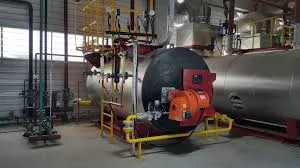
Nov . 08, 2024 12:02 Back to list
Ensuring Safety Standards for Steam Boiler Operations and Maintenance Practices
The Importance of Steam Boiler Safety
Steam boilers play a vital role in various industries, providing essential heat and power. From manufacturing to energy production, these systems help streamline numerous processes. However, the inherent risks associated with steam boilers, including explosions and equipment failure, necessitate strict safety measures to protect both personnel and property. This article explores the key aspects of steam boiler safety, highlighting essential practices and regulatory standards.
Understanding Steam Boiler Operations
A steam boiler operates by heating water to generate steam, which is then used for heating or powering equipment. The process involves high temperatures and pressures, making it crucial to maintain a safe operating environment. The potential hazards associated with steam boilers include excessive pressure build-up, overheating, and equipment corrosion. If not addressed, these factors can lead to catastrophic failures.
Regulatory Standards
In order to ensure safety in steam boiler operations, various regulatory bodies have established standards and guidelines. In the United States, the American Society of Mechanical Engineers (ASME) sets forth the Boiler and Pressure Vessel Code (BPVC), which outlines the design, construction, and inspection requirements for boilers. Similarly, the National Fire Protection Association (NFPA) provides regulations aimed at preventing fires and explosions in boiler facilities.
Compliance with these standards is not merely a legal obligation but a fundamental aspect of operational safety. Regular inspections and maintenance are required to ensure that steam boilers are functioning within safe parameters.
Regular Maintenance and Inspections
Routine maintenance and inspections are critical in preventing boiler failures. Maintenance procedures typically include checking the water levels, inspecting pressure gauges, and examining safety valves. Additionally, operators should clean the boiler's components regularly to prevent corrosion and scale build-up, which can compromise the boiler's efficiency and safety.
Inspections should be scheduled at least once a year by qualified professionals to assess the integrity of the boiler. These experts can identify potential issues early, such as leaks, cracks, or irregular performance, allowing for corrective actions before they escalate into dangerous situations.
steam boiler safety

Operator Training and Safety Protocols
Another essential facet of steam boiler safety is operator training. Personnel responsible for operating and maintaining steam boilers must receive proper training to understand the risks and operational procedures. Training programs should cover topics such as safety protocols, emergency procedures, and the specific characteristics of the boilers they operate.
Developing and enforcing safety protocols is necessary to create a culture of safety within the organization. This can include procedures for routine checks, emergency response plans, and installation of safety devices such as pressure relief valves. Encouraging open communication about safety concerns among staff can also contribute to a safer working environment.
Emergency Preparedness
Despite best efforts, emergencies can still occur. Therefore, it's vital to establish an emergency preparedness plan that outlines the steps to be taken in case of a boiler failure or explosion. This plan should include evacuation routes, emergency contact information, and the location of first aid kits. Regular drills should be conducted to ensure that all personnel are aware of the procedures and can act quickly in an emergency.
Modern Technology and Innovations
In recent years, advancements in technology have significantly improved boiler safety. Modern steam boilers are equipped with sophisticated monitoring systems that provide real-time data on pressure, temperature, and other critical parameters. These systems can automatically shut down the boiler if unsafe conditions are detected, reducing the risk of accidents.
Moreover, the evolution of materials used in boiler construction has enhanced durability and reduced the likelihood of failures due to corrosion or wear. Implementing these technologies can lead to increased efficiency and safety in steam boiler operations.
Conclusion
The importance of steam boiler safety cannot be overstated. Proper adherence to regulatory standards, regular maintenance, and a well-trained workforce are crucial components of a safe operating environment. By prioritizing safety measures and leveraging modern technology, industries can minimize the risks associated with steam boilers, protecting their employees and assets. In an era where safety is paramount, cultivating a proactive approach to boiler safety is not just beneficial; it is essential for sustainable operations.
-
Precision Steam Pressure Control Systems for Efficient Boiler Operations
NewsMay.22,2025
-
Optimize Steam Boiler Efficiency with Precision Control Systems Steam Boiler Control
NewsMay.22,2025
-
Professional Hot Water Boiler Schematic Diagrams & Steam System Layouts
NewsMay.22,2025
-
Steam Boiler Blowdown Guide Frequency, Safety & Efficiency Tips
NewsMay.21,2025
-
Steam Boiler Safety Devices & Valves Certified Overpressure Protection
NewsMay.21,2025
-
High-Temp Thermal Oil Boilers Optimal Boiling Point Efficiency
NewsMay.20,2025
Related PRODUCTS






















